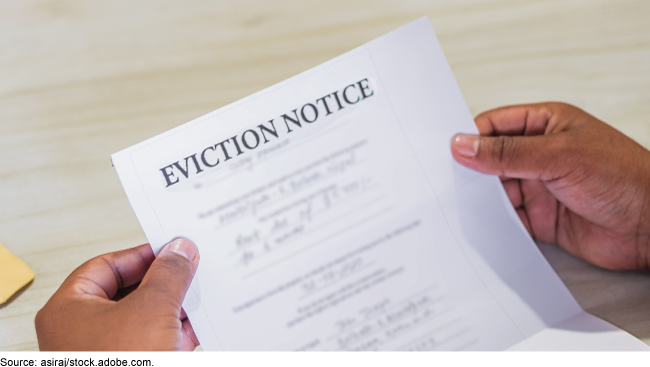Covid-19 Housing Protections: Moratoriums Have Helped Limit Evictions, but Further Outreach Is Needed
Fast Facts
The COVID-19 pandemic continues to affect the housing and financial stability of millions of renters and property owners. To help, Congress appropriated $25 billion in emergency rental assistance, and the Centers for Disease Control and Prevention (CDC) ordered a moratorium on residential evictions.
Yet, some eligible renters may experience challenges accessing these protections. Some renters may not know that they have to take action to become protected under the moratorium, and others may not understand all of the required steps. We recommended that the CDC implement an outreach plan to help renters better understand its eviction moratorium.

Highlights
What GAO Found
Eviction moratoriums at the federal, state, and local levels reduced eviction filings during the COVID-19 pandemic; however, some eligible renters may not have benefitted from a recent federal moratorium. GAO's analysis of 63 jurisdictions found that the median rate of eviction filings was about 74 percent lower in the last week of July 2020—when a moratorium included in the CARES Act expired—than in the same week in 2019. Eviction filings remained lower throughout 2020 (relative to 2019) but gradually increased during a separate moratorium ordered by the Centers for Disease Control and Prevention (CDC) in September 2020 (see fig.). During this moratorium, jurisdictions without separate state or local moratoriums experienced larger increases in eviction filings, which suggests that some renters may not fully understand how to use the CDC moratorium (completing required documentation). CDC extended its moratorium through March 31, 2021, but has taken few steps to promote awareness and understanding of the moratorium and its requirements. Clear, accurate, and timely information is essential to keep the public informed during the pandemic. Without a communication and outreach plan, including federal coordination, CDC will be missing an opportunity to ensure that eligible renters avoid eviction.
Year-over-Year Percentage Change in Eviction Filings in 63 Jurisdictions

Note: Centers for Disease Control and Prevention's (CDC) moratorium is active through March 31, 2021. Local moratoriums include separate state or local eviction moratoriums. Unlike the CARES Act, CDC's moratorium does not prohibit eviction filings, which could explain some increases.
By late January 2021, Treasury had disbursed 99 percent of the $25 billion in Emergency Rental Assistance funds to state and other eligible grantees responsible for making rent and utility payments to recipients. Treasury's initial program guidance issued that month did not fully define some program requirements and included requirements that could have delayed the delivery of funds or deter participation. In late February 2021, Treasury updated its guidance to address several of these concerns, such as by providing grantees with flexibility for prioritizing lower income applicants and allowing written attestation of income. Although the guidance did not clarify certain data collection and spending requirements, officials said they will continue to update guidance to address stakeholder concerns and strike a balance between accountability and administrative efficiency. GAO will continue to actively monitor these efforts.
Why GAO Did This Study
Millions of renters and property owners continue to experience housing instability and financial challenges during the COVID-19 pandemic. To address these concerns, Congress and CDC created eviction moratoriums, and Congress appropriated $25 billion to Treasury to disburse to state and local grantees to administer emergency rental assistance programs to help those behind on their rent.
The CARES Act includes a provision for GAO to monitor federal efforts related to COVID-19. This report examines, among other objectives, (1) how eviction moratoriums have contributed to housing stability during the pandemic and (2) Treasury's implementation of the Emergency Rental Assistance program.
GAO analyzed data on eviction filings and local policies in a sample of 63 jurisdictions (selected based on data availability) from January to December 2020. GAO also analyzed Census Bureau survey data on rental payments and data from federal housing entities on mortgage forbearance. GAO interviewed officials from CDC, Treasury, and organizations representing renters, property owners, and rental assistance grantees.
Recommendations
GAO recommends that CDC, in coordination with relevant federal entities, implement a communication and outreach plan designed to ensure renters and property owners are aware of the agency's eviction moratorium. Department of Health and Human Services disagreed with the recommendation. GAO continues to believe the recommendation is valid, as discussed in this report.
Recommendations for Executive Action
| Agency Affected | Recommendation | Status |
|---|---|---|
| Centers for Disease Control and Prevention | The Director of the Centers for Disease Control and Prevention, in coordination with other relevant federal entities, should develop and implement a communication and outreach plan designed to ensure that eligible renters and property owners are aware of and able to use the agency's moratorium to prevent eviction. (Recommendation 1) |
This recommendation is closed as implemented. In April 2021, CDC officials confirmed that the agency initiated efforts to coordinate with federal entities to communicate about the eviction moratorium. In March 2021, the Acting Director of the Consumer Financial Protection Bureau and the Acting Chairwoman of the Federal Trade Commission issued a joint statement highlighting new efforts to monitor and enforce the moratorium, including working with CDC to make renters aware of their rights under the moratorium and help them understand how to complete the required declaration form. The Consumer Financial Protection Bureau later issued an interim final rule in April 2021 in support of the CDC moratorium that requires debt collectors to provide written notice to tenants of their rights under the moratorium and prohibits debt collectors from misrepresenting tenants' eligibility. These efforts meet the intent of our recommendation.
|
